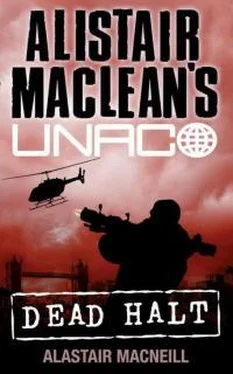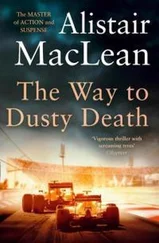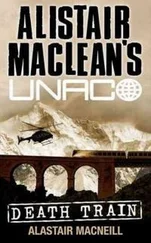The door opposite swung open and a nurse emerged into the corridor. She smiled at Graham. “Mr. Paluzzi’s just regained consciousness. You can go in now if you like. But not for long. He’s still very weak.”
“Can we both go in?” Whitlock asked.
“Yes. Is either of you called C.W.?” she asked.
“Yes, I am,” Whitlock replied in surprise. “Why?”
“He’s been asking for you ever since he came round. I’ll be back in a few minutes to give him another sedative.”
Whitlock waited until the nurse had left then pushed open the door and peered into the ward.
“It’s not contagious,” Paluzzi said in a croaky voice. His face was pale and his eyes were still glazed from the effects of the anesthetic. He managed a weak smile when Graham entered the room behind Whitlock. “Hey, Mike, how you doing?”
“Better than you by the looks of it,” Graham replied, pulling up a chair and sitting down. “How you feeling, buddy?”
“How do I look?”
“Like a stiff,” Graham replied with a grin.
“Then you know how I feel.” Paluzzi looked at Whitlock. “Did Gallagher get away?”
Whitlock nodded. “Yes.”
“And what about Scoby?” Paluzzi asked.
“He’s fine,” Whitlock replied. “He asked me to send you his best wishes for a speedy recovery.”
“What can I say?” Paluzzi retorted facetiously.
“Say it in Italian,” Graham said disdainfully. “That way you won’t offend any of the nurses.”
“That’s enough, you two,” Whitlock said with a reprimanding scowl.
“Where’s Sabrina?” Paluzzi asked.
“She’s at the hotel. Somebody has to keep an eye on the senator,” Whitlock told him. “But she did say she’d be along to see you sometime before we go over to the ambassador’s house tonight.”
“Does Claudine know I’m here?”
Whitlock shook his head. “I thought it best to talk to you first about that. Do you want me to call her?”
“I would rather do it myself,” Paluzzi replied. “If I know Claudine, she won’t take it well. But if I can reassure her personally that I’ll be OK, it’ll help to soften the blow.”
“If she wants to fly out, tell her to book the flight and UNACO will reimburse her for the ticket.”
“I’ll tell her, thanks,” Paluzzi replied.
The door opened and the nurse entered the room.
“I’m sorry, gentlemen, but you’ll have to leave now. You can come back again during visiting hours.”
“Of course,” Whitlock replied.
“C.W., wait,” Paluzzi said. He looked across at the nurse. “Could you give us another couple of minutes, please? It’s very important.”
“The doctor was very insistent that you get as much rest as possible,” the nurse replied.
“Please, it’s very important,” Paluzzi pleaded weakly.
“OK. Two minutes. But then I’m coming back to give you another sedative.”
Paluzzi waited until the nurse had gone before looking up at Graham. “Mike, I need to talk to C.W.”
“Sure thing,” Graham replied, getting to his feet.
“Wait a minute, Mike,” Whitlock said, putting a restraining hand lightly on Graham’s arm. He turned back to Paluzzi. “You’re going back to Italy, aren’t you? It’s OK to talk in front of Mike, he’ll find out about it soon enough.”
“Yes,” Paluzzi said softly. “How did you know?”
“I’ve known since you first mentioned it to me,” Whitlock replied with a smile. “You’d have been crazy to have turned it down. And obviously what happened earlier this afternoon has made the decision that much easier for you.”
“Hey, could somebody tell me what this is all about?” Graham cut in before Paluzzi could reply.
“You remember my boss at the NOCS, Brigadier Michele Pesco?” Paluzzi asked Graham.
“I heard about him but I never actually met him,” Graham replied. “He was one of the reasons why you left the NOCS to come over to us.”
“That’s right,” Paluzzi agreed. “Well, he was relieved of his command two days ago. The Joint Chiefs-of-Staff offered the job to me. It’s something I’d always wanted ever since I joined the NOCS. And much as I want to stay with UNACO, I know the chance may never come again.”
“C.W.’s right, you’d have been crazy to turn it down,” Graham said. “Have you told Claudine yet?”
“She doesn’t even know I’ve been offered the position. I’ll tell her when I see her. I know she’ll be thrilled. She’s never really settled in New York.”
“He made the right decision,” Graham said once they were in the corridor.
“I know.”
“Who’ll be sent out to replace him?”
“Nobody’s being sent out,” Whitlock replied.
“Give us a break, C.W.,” Graham shot back. “We were stretched as it was even before Fabio was injured. How do you expect Sabrina and me to carry the workload by ourselves?”
“I never said Fabio wasn’t being replaced,” Whitlock corrected him. “What I did say was that nobody’s being sent over to replace him.”
Graham stopped in his tracks and eyed Whitlock suspiciously. “You?”
“It was the obvious solution. I cleared it with Sergei before I came over here.”
“Does Sabrina know?”
“Not yet. But then it’s not for me to tell her. That’s your job as head of Strike Force Three.”
“What are you talking about, C.W.? You’re still the senior man around here.”
“I’m still the Deputy Director of UNACO, but you call the shots in your team. And I’m now part of your team.”
“You mean I now have rank over you in the field?” Graham said with obvious delight.
“As long as I’m a part of your team, yes.” Whitlock paused at the entrance and wagged a finger of warning at him. “But don’t push it or I’ll have your arse the moment we get back to New York.”
Yeah, you probably would, Graham thought to himself as he hurried after Whitlock, who was already making his way back to the car.
When Fiona left the safe house for the last time she was wearing a plain black skirt, a baggy red sweater and the familiar black trilby which was tugged down firmly over her spiky blonde hair. She took the tube to Heathrow Airport and was told that the Belfast flight was scheduled to leave on time. After checking in she bought a copy of the Independent then went through to the cafeteria and treated herself to a coffee and a sandwich. She found a seat by the window then opened her overnight bag and withdrew the envelope containing the third plan for the assassination of Scoby: the letter “C” was inscribed on its cover. She didn’t bother opening it. Instead she put it down on the table then turned her attention to the front page of the Independent .
She was on her second coffee when her flight was announced over the loudspeaker. She picked up her overnight bag and made her way to the departure lounge, leaving the unopened envelope on the table.
The envelope was discovered by a cleaner after the flight had taken off. She handed it in to her supervisor who opened it, hoping to discover an address so he could forward it on to the owner. He looked inside. It was obviously some prank: it was empty. He tossed the envelope into the bin at the side of his desk and went back to his paperwork.
The rain pummeled the Mercedes as it hurtled along a deserted road in County Armagh. Inside were three men. The driver, Hagen, and McAuley, who sat beside him, had both served time for their part in an IRA bombing campaign on the British mainland in the early eighties. McAuley was armed. The third man, who was seated in the back of the car, was in his late thirties with thinning brown hair and a pale, cadaverous face. Kevin Brady was the Chief-of-Staff of the IRA’s military wing, the Army Council. He was a cold, dispassionate man who had an unnerving habit of speaking in an unvarying monotone. Quick to reward initiative and even quicker to punish failure, he had been known to order the execution of entire families simply by a nod of his head or a snap of his fingers if he thought it would prove a point. The majority of those on the Army Council were prepared to overlook his faults because of his tactical successes in the field, but there were a small number who were fiercely opposed to his brutal methods, especially those relating to internal discipline, and who felt that the only way to displace him would be to have him killed …
Читать дальше











